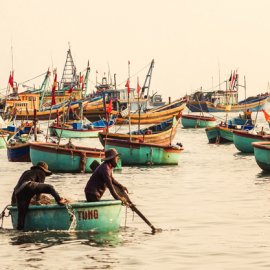Looking East from West
-
English
-
ListenPause
[intro music]
Welcome to World Ocean Radio…
I’m Peter Neill, Director of the World Ocean Observatory.
I recently spent two weeks in Japan, an island nation. I have lived there before, and visited since, but the changes over time, and since an economic downturn and the pandemic, were visible and felt, in the landscape and by comparison to the United States, my home. Foreigners were visiting in record number. The cherry blossoms were in full array. A recent earthquake with mudslides and floods near Tokyo had reminded everyone of the fragility of the land, just as resultant tsunami had asserted vulnerability from the sea. In the cities, viewed from fast trains, in the parks and gardens, glimpses of water were a constant reminder that Japan seems to float on the ocean, indeed a floating world of the senses, omnipresent in its social synergies, in external trade, related employment, and diet. The markets were fulsome, every species from the sea on display, the daily, pervasive effect of a surrounding sea.
It so happened that every city and town I visited had a river running through it or a direct ocean connection. From my Tokyo hotel room, I could see the passage of the Sumida River and the shipping on Tokyo Bay. Osaka remains a major international port. Kyoto has water eternally through gardens, down hillsides, into the temples where small basins are availed for a drink or a ritual washing. Amanohashiodate, on the north coast, on Miyazu Bay and the Japan Sea, is oriented to a spectacular confluent juxtaposition of fresh water and salt, with an anomalous forested beach in between. The nearby fishing town of Ine was a vital, historical evocation of houses, boats, tools, and working waterfront, combined into a utilitarian arc around the small, but active harbor. As I walked through, everywhere I looked there were things marine: tiny fish, weeds, old nets, gear, small boats, engine parts, work clothes—all set out to dry for future use in perfect compositions. The sea air was vivifying in extreme.
Japan is a unique, dichotomous place. An emperor, and an elected legislature. Giant corporations and powerful unions. Packaging fetish and recycling compulsion. Density, cleanliness, accepted order. Streets with no trash and impeccably clean public restrooms everywhere. A national transportation system that is accessible, fairly priced, well-maintained, and on time. No tipping, full-service staffing, little unemployment. Aging population and manic youth culture. Coordinated national educational curriculum. Modest crime, few murders, police who carry no guns. Respect for history, religious differences, and the authentic; celebration of the modern in fashion, art, architecture, technology, and innovation. Diet maintained by local harvest, fresh, low-fat ingredients, small portions, and myriad servings as evidence of sustainable variety and surfeit.
Everywhere, I found civility: formal politeness in behavior and speech: respect, openness, humor, and earnest attempt to understand the stranger, the other, the person who is not you, but deserves your respect as a cultural norm. Japanese culture has been portrayed as stifling and repressive, and indeed it does present a deference to the collective over the individual. It was explained to me that the word in Japanese for freedom implies selfishness, a standing outside the accepted order. Looking west from east, by contrast, freedom as individualism embraces disruption, now often without purpose, disruption where protections guaranteed by equality are broken and destructive to the common good. The contrast is stark.
Over the years, I have come upon the notion of “thinking like an island.” The earth, our ocean world, is a collection of islands, be they atolls, nations, or continents – all island communities, where life is determined by different limits, needs, and utilities. Islanders must be reliant on things to hand: water locally drawn, food locally harvested, competence locally applied to survive. I have no interest in romanticizing island life; it is hard, challenging, often lonely, not always united in family, politics and opinions, and forever formed by challenging, confrontational natural forces.
But there are distinct, unifying values evident in such places: independence, self-reliance, practicality, frugality, ingenuity, respect for work, success within limits, cooperation, community, and, yes, civility and order. What if we looked at our cities, our regions, even our nations through an island lens? Looking east from west, I ask: what if, as in Japan, we applied such values individually, locally, and nationally to our purchases, our foodways, our institutions, our expectations of governance, our public relations, our life choices, our social and political consciousness and conscience?
No man is an island, Entire of itself; Every man is a piece of the continent, A part of the main, writes John Donne in his famous sonnet.
Look from the East, look from the West: are we not all islanders?
We will discuss these issues, and more, in future editions of World Ocean Radio.
[outro music]
After a recent visit to Japan, an island nation, World Ocean Radio host Peter Neill ponders, what if, as in Japan, we applied values individually, locally, and nationally to our purchases, foodways, institutions, public relations, our life choices? Look from the East, look from the West: are we not all islanders?
About World Ocean Radio
World Ocean Radio is a weekly series of five-minute audio essays available for syndicated use at no cost by college and community radio stations worldwide. Peter Neill, Director of the World Ocean Observatory and host of World Ocean Radio, provides coverage of a broad spectrum of ocean issues from science and education to advocacy and exemplary projects.
World Ocean Radio
14 Years, 700+ Episodes
Ocean is climate
Climate is ocean
The sea connects all things
- Login to post comments



